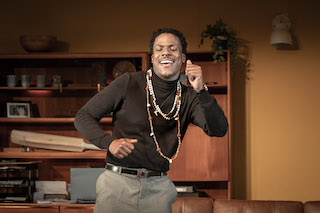This blistering, fearless play about an 18-year-old black entrepreneur on the King’s Road raises a myriad of uncomfortable questions that resonate profoundly with the Black Lives Matter debate. It’s just one remarkable aspect of The Death of a Black Man that it was written 46 years ago, and another that such a radical work was first staged not at the Royal Court but at the Hampstead Theatre, to which it now makes its return.
The playwright Alfred Fagon is currently best known for the award for black writers which bears his name: past winners include Roy Williams and Michaela Coel. Fagon died tragically on the street from a heart attack in 1986 at the age of 49, returning from a jog. Despite the police searching his flat, which contained, among other things, his passport, they declared they couldn’t identify him, and had him cremated in a pauper’s ceremony. In the ensuing outrage, Oberon Books published three of his plays and the award was established.
That question of the once barely concealed contempt of the white establishment for black people, no matter what their achievements, burns through The Death of a Black Man. Dawn Walton’s slick, stylish production opens with a monologue from Nickcolia King-N’da as Shakie. He is standing in front of a cricket scoreboard, dressed in military gear and holding a cricket bat like a machine gun. The West Indian cricket team has just smashed the England team in that year’s Test Matches, with Gary Sobers scoring more than three centuries, and Shakie is high on exhilaration and champagne.
The curtain goes up to reveal his swanky Chelsea flat, which Shakie can afford because he trades African artefacts on the King’s Road. Yet the evening becomes disturbing very quickly as the witty, coolly confident Jackie (played with extraordinary dignity and self-possession by Natalie Simpson) enters and teases him for his pretensions, "Little boy blue, you sure talk a lot of shit!" Their conversation is sexually charged from the get-go – as Shakie observes that "You look as sexy as ever." Quickly she hits back, "You are getting ready to rape me! Like you have always done in the past."
This is not delivered as victim-speak but with the swagger of someone who feels compelled to swim in shark-infested waters. Who is abused and who the abuser is as yet unclear. Jackie is 13 years older, yet quickly we find out that Shakie has fathered her baby. It’s only when she sued him for maintenance that she discovered that when they first met he was 15 and not 21 as he claimed. Beneath the poisoned patter of their exchanges flares the question of how limited opportunities once were in this country for two black people with their fizz and attitude. Although we never see him, Shakie’s father constantly haunts the conversation; a brilliant and acclaimed West Indian musician who, because of his skin colour, has been forced to seek out his living playing in pubs. Shakie has decided to deal with this by playing his own cynical games to fit in with white society; sourcing furniture made in Yorkshire and passing it off as exotic homeware to the gullible rich. It’s only when Shakie’s friend Stumpie (Toyin Omari-Kinch, pictured above), a party boy with a pan-African vision, turns up, that a discussion emerges about how they should really forge both their identities and their fortunes.
Beneath the poisoned patter of their exchanges flares the question of how limited opportunities once were in this country for two black people with their fizz and attitude. Although we never see him, Shakie’s father constantly haunts the conversation; a brilliant and acclaimed West Indian musician who, because of his skin colour, has been forced to seek out his living playing in pubs. Shakie has decided to deal with this by playing his own cynical games to fit in with white society; sourcing furniture made in Yorkshire and passing it off as exotic homeware to the gullible rich. It’s only when Shakie’s friend Stumpie (Toyin Omari-Kinch, pictured above), a party boy with a pan-African vision, turns up, that a discussion emerges about how they should really forge both their identities and their fortunes.
Nobody covers themselves with glory as Shakie and Stumpie are sucked into a vortex of champagne-swilling, drug-taking and debate which is often both misogynistic and anti-Semitic. Simon Kenny’s vibrant design and the punchy performances evoke the sass and attitude of Steve McQueen’s wonderful Small Axe television series, but as the action continues we enter Greek tragedy territory. When the news comes that Shakie’s father has died, it raises profound questions about how Shakie should deal not only with his death, but the way he was treated when he was alive. His solution is as damaged as it is disturbing.
This is intelligent theatre with an unflinching vision; it’s part of its power that it will not leave you sitting comfortably. All the characters take actions that you condemn as an onlooker. Yet you are forced, too, to think about what has been done to them by white society’s sexualisation of black culture and the fetishisation of its more "exotic" aspects, at the same time as it has consigned black people to the lowest rungs of employment and social status.
The standout performance of the evening is from Natalie Simpson’s Jackie. As a woman, her character is – as with so many plays from this time – not fully realised, yet she executes the role with style, wit and gravitas. It’s in no small part down to her that this is theatre with fire in its belly. The increasingly free-wheeling script may have flaws, but Fagon still rises up as an urgent and troubling voice from the past.















Add comment